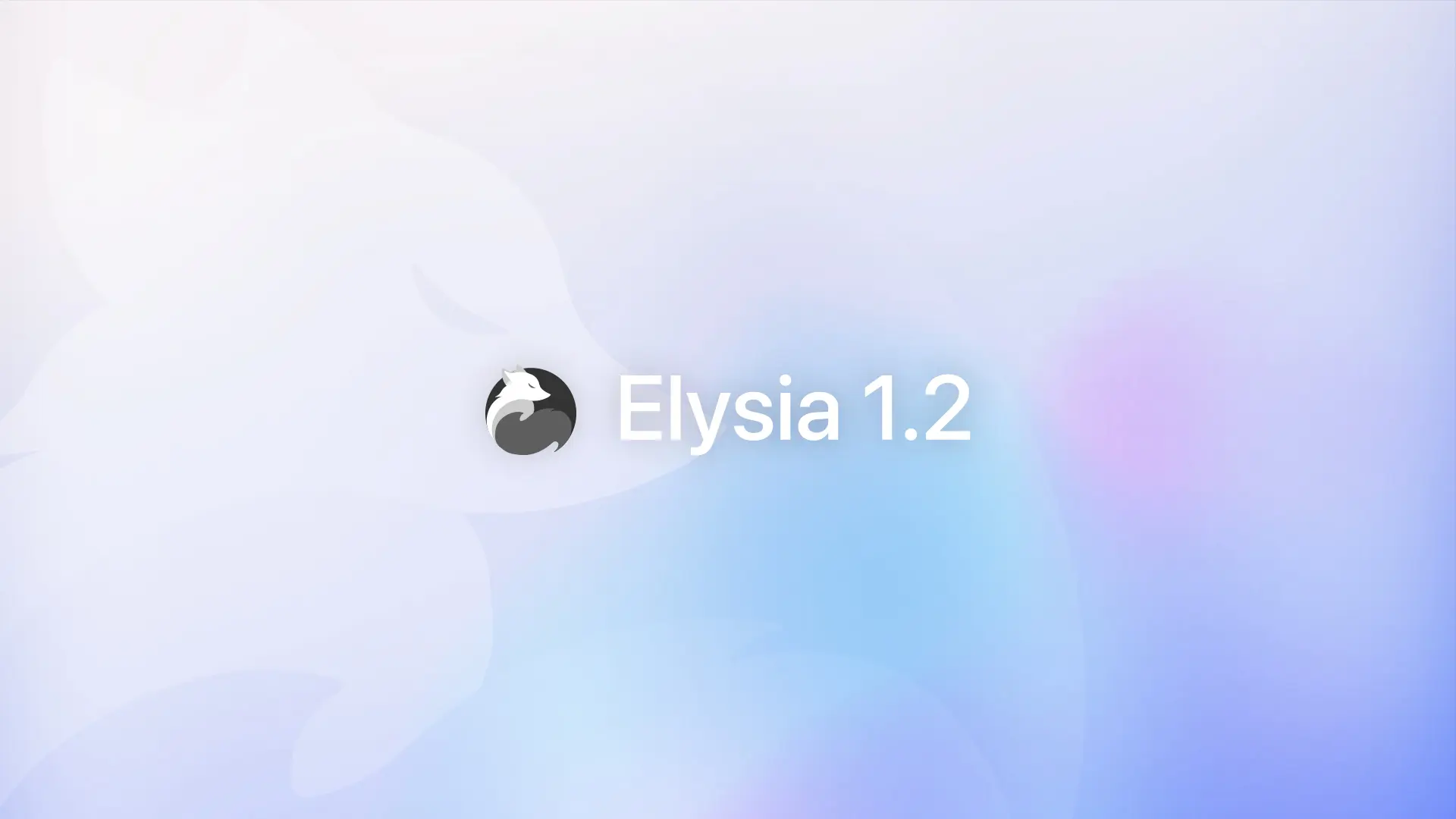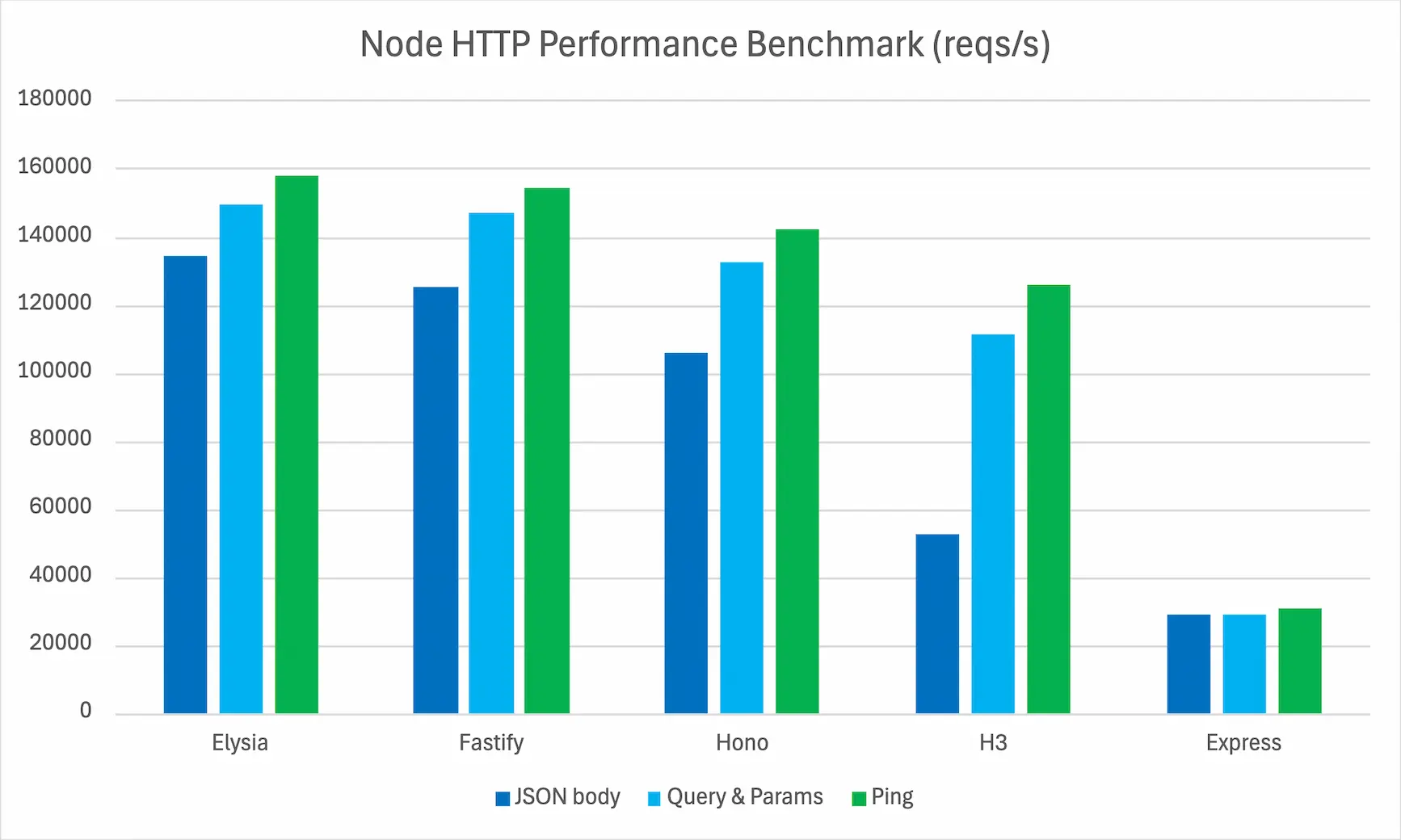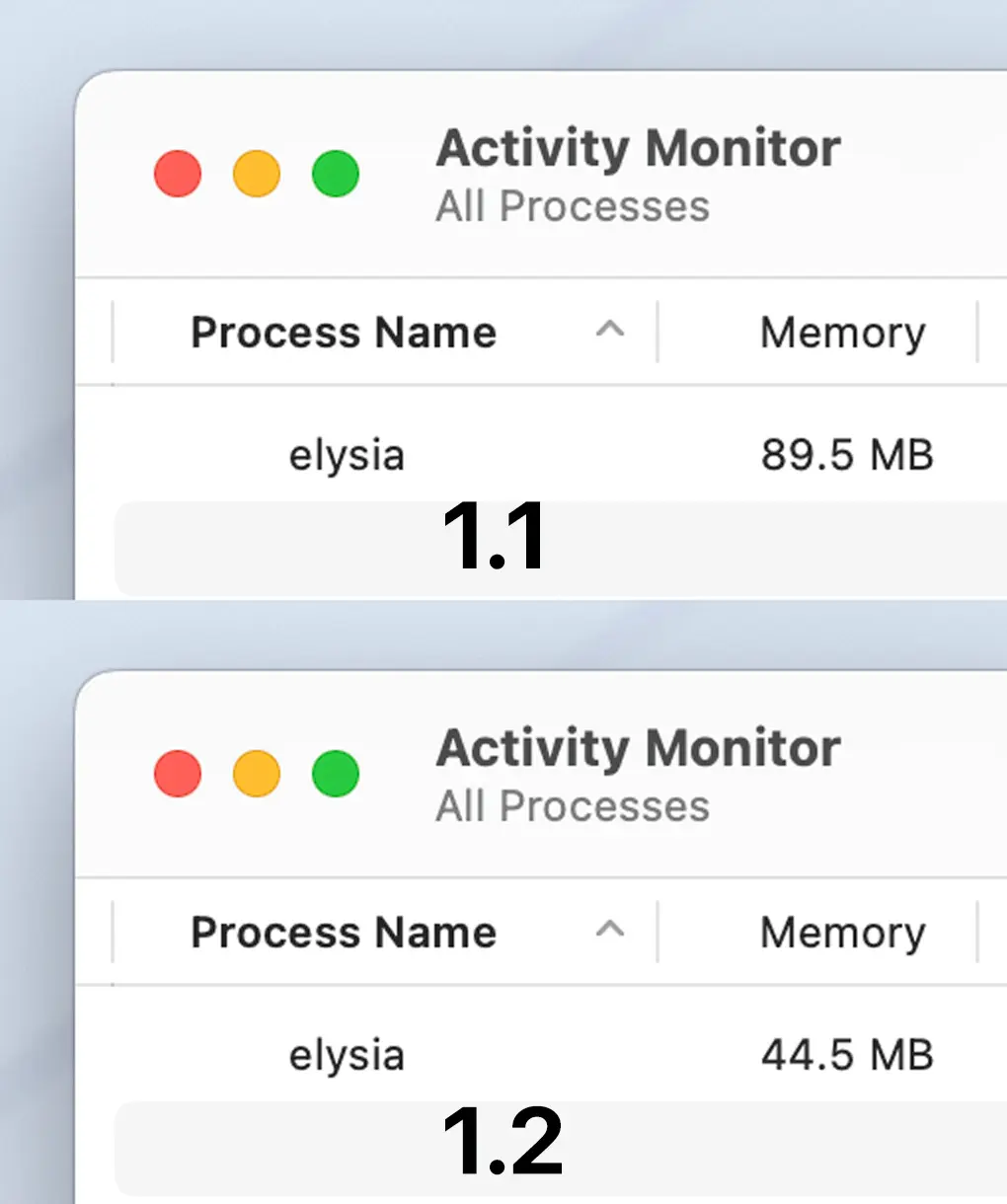Elysia 1.2 - You and Me

Named after the song Φ² from album "At the Fingertip of the Sea" by HoyoMix as used in "You and Me".
Elysia 1.2 focuses on commitment to expand universal runtime support and developer experience:
Adapter
One of the most requested features is to support more runtimes.
Elysia 1.2 introduces adapter to allow Elysia to run on different runtimes.
import { node } from '@elysiajs/node'
new Elysia({ adapter: node() })
.get('/', 'Hello Node')
.listen(3000)Elysia is designed to be run on Bun and will continue to have Bun as the primary runtime and prioritize feature on Bun first.
However, we are giving you more choice to try Elysia on different environment that fits your need, eg. serverless like AWS Lambda, Supabase Function, etc.
The goal of Elysia's adapter is to provide a consistent API across different runtime while maintaining the best performance with the same code or with minimal changes for each runtime.
Performance
Performance is one of Elysia's strength. We do not compromise on performance.
Instead of relying on a bridge to convert Web Standard's request to Node Request/Response. Elysia use the native Node API directly to achieve the best performance while providing Web Standard compatibility if needed.
By utilizing Sucrose static code analysis, it allows Elysia to be faster than most Web-Standard frameworks like Hono, h3, and even native Node framework like Fastify, Express.

As usual, you may find the benchmark in Bun HTTP framework benchmark.
Elysia now has supports runtime adapter for:
- Bun
- Web Standard (WinterCG) eg. Deno, Browser
- Node (beta)
Although Node adapter is still in beta, it has the most features you expected from returning Generator Stream to WebSocket. We recommended you to try it out.
We will continue to expand support for more runtimes in the future starting with:
- Cloudflare Worker
- AWS Lambda
- uWebSocket.js
Universal runtime API
To be compatible with different runtime, Elysia now wraps over a hand-picked utility function to provide a consistent API across different runtime.
For example, in Bun you may use Bun.file to return a file response which is not available in Node.
import { Elysia } from 'elysia'
import { Elysia, file } from 'elysia'
new Elysia()
.get('/', () => Bun.file('./public/index.html'))
.get('/', () => file('./public/index.html')) These utility functions are a replicated of Bun's utility function designed to be compatible with runtime that Elysia has supports for which will be expanded in the future.
Currently, Elysia has supports for:
file- Return a file responseform- Return a formdata responseserver- A port of Bun'sServertype declaration
Macro with resolve
Starting with Elysia 1.2, you can now use resolve in macro.
import { Elysia } from 'elysia'
new Elysia()
.macro({
user: (enabled: true) => ({
resolve: ({ cookie: { session } }) => ({
user: session.value!
})
})
})
.get('/', ({ user }) => user, {
user: true
})With the new macro object syntax, instead of retriving lifecycle you can now return it instead to reduce boilerplate.
Here's a comparison between the old and new syntax:
// ✅ Object Macro
new Elysia()
.macro({
role: (role: 'admin' | 'user') => ({
beforeHandle: ({ cookie: { session } }) => ({
user: session.value!
})
})
})
// ⚠️ Function Macro
new Elysia()
.macro(({ onBeforeHandle }) => {
role(role: 'admin' | 'user') {
onBeforeHandle(({ cookie: { session } }) => ({
user: session.value!
})
}
})Both syntax are supported but the new object syntax is recommended. We don't have plan to remove the previous syntax but we will focus on the new object syntax with new features.
INFO
Due to TypeScript limitation, macro's resolve only works with the new object syntax but not with previous one.
Name Parser
Elysia 1.2 introduce a parser with a custom name, allowing you to specify which parser should be used for decoding request body.
import { Elysia } from 'elysia'
new Elysia()
.parser('custom', ({ contentType }) => {
if(contentType === "application/kivotos")
return 'nagisa'
})
.post('/', ({ body }) => body, {
parse: 'custom'
})parser has a similar API to onParse but with a custom name allowing you to reference it in a route.
You may also reference Elysia's built-in parser or provide multiple parsers to be used in order.
import { Elysia } from 'elysia'
new Elysia()
.parser('custom', ({ contentType }) => {
if(contentType === "application/kivotos")
return 'nagisa'
})
.post('/', ({ body }) => body, {
parse: ['custom', 'json']
})Parsers will be call in order, if the parser does not return a value, it will move to the next parser until one of the parser returns a value.
WebSocket
We have rewrite WebSocket to be more performant and match the API and behavior with the latest Bun's WebSocket API while maintaining compatibility with each runtime.
new Elysia()
.ws('/ws', {
ping: (message) => message,
pong: (message) => message
})WebSocket now has a more consistent API with HTTP route and has a similar lifecycle as HTTP route.
TypeBox 0.34
Elysia 1.2 now has support for TypeBox 0.34.
With this update, Elysia now use TypeBox's t.Module to handle reference model to support circular recursive type.
import { Elysia, t } from 'elysia'
new Elysia()
.model({
a: t.Object({
a: t.Optional(t.Ref('a'))
})
})
.post('/recursive', ({ body }) => body, {
body: 'a'
})Reduced Memory usage
We have refactor Sucrose's generated code for a swappable code generation process.
By refactoring for a better code duplication, router optimization, and unnecessary code removal.
This allows Elysia to reuse code from several parts and reduce large portion of memory usage.
For our project, by simply upgrading to Elysia 1.2, we seen up to 2x memory reduction from 1.1.

This memory optimization is scaled with the number of routes and the complexity of the route. So you may see reduced memory usage exponentially.
Notable update
Below are some of the notable improvement that are made in Elysia 1.2.
Eden validation error
Eden also now automatically infers 422 status code if validation model is provided.
import { treaty } from '@elysiajs/eden'
import type { App } from './app'
const api = treaty<App>('localhost:3000')
const { data, error } = await api.user.put({
name: 'saltyaom'
})
if(error)
switch(error.status) {
case 422:
console.log(error.summary)
break
default:
console.error(error)
}Router
We have updated route registration deduplication to be more optimized.
Previously Elysia will check all of the possible route to prevent route deduplication. Now Elysia use a checksum hash map to check if the route is already registered and merged routing and code generation process loop for static route registration to improve performance.
Changes
- Event Listener now infers path parameter automatically based on scope
- Add ‘scoped’ to bulk
asfor casting type to ‘scoped’ similar to ‘plugin’ - Update
cookieto 1.0.1 - Update TypeBox to 0.33
content-lengthnow accept number- use 16-degit hexadecimals for
idintrace - disable
minifyin production build for better debugging/error reporting
Breaking Change
There should be minor required changes to your codebase to adapt to upgrade to Elysia 1.2.
However, these are all the changes that you need to be aware of.
parse
type is now merged with parse to allow control over order of custom and built-in parser.
import { Elysia, form, file } from 'elysia'
new Elysia()
.post('/', ({ body }) => body, {
type: 'json'
parse: 'json'
})formdata
Starting from 1.2, you now have to explicitly return form if the response is a formdata instead of automatically detect if file is present in 1-level deep object.
import { Elysia, form, file } from 'elysia'
new Elysia()
.post('/', ({ file }) => ({
.post('/', ({ file }) => form({
a: file('./public/kyuukurarin.mp4')
}))WebSocket
WebSocket method now return thier respective value instead of returning WebSocket.
Thus removing the ability to do method chaining.
This is to make WebSocket match the same API with Bun's WebSocket API for better compatibility and migration.
import { Elysia } from 'elysia'
new Elysia()
.ws('/', {
message(ws) {
ws
.send('hello')
.send('world')
ws.send('hello')
ws.send('world')
}
})scoped
Elysia now removed the constructor scoped as it might be confused with scope's scoped/global
import { Elysia } from 'elysia'
new Elysia({ scoped: false })
const scoped = new Elysia()
const main = new Elysia()
.mount(scoped) Internal breaking changes
- Remove router internal property static.http.staticHandlers
- Router history compile now link with history composed
Afterword
Elysia 1.2 is an ambitious update that we have been working on for a while.
A gambit to expand Elysia's reach to more developer and more runtime but there are something else I want to say as well.
Let's start this again.
Hi, how are you? I hope you are doing well.
I still love doing this, writing blog post about Elysia. It's has been a while since then.
You may noticed that it has been a while since the last update, and it's not a long one. I'm sorry for that.
I hope you understand that we also have our own life to take care of. We are not a robot, we are human. Sometime about life, sometime about work, sometime about family, sometime financially.
I want to be with you all the time.
Doing what I love, keep updating Elysia, keep writing blog post, keep making art but you know that I have something to take care of too.
I have to bring food to table, I have take care of a lot of things financially. I have to take care of myself too.
I hope you are doing well, I hope you are happy, I hope you are healthy, I hope you are safe.
Even if I'm not here. A part of me known as Elysia will be with you.
Thanks for being with me.
Here I feel the touch brought by the real number solution.
Ripples of two souls now have reached our double slits.
Casting stripes of light and dark in the world as days and nights.
You set me free under the sun.
I fly your cradle dreams to the moon and back.
A worm will turn into a butterfly,
before one can answer "who am I".
After the ice turns into water,
the sea I hang upside down will be your sky.
And we finally met again, Seele.